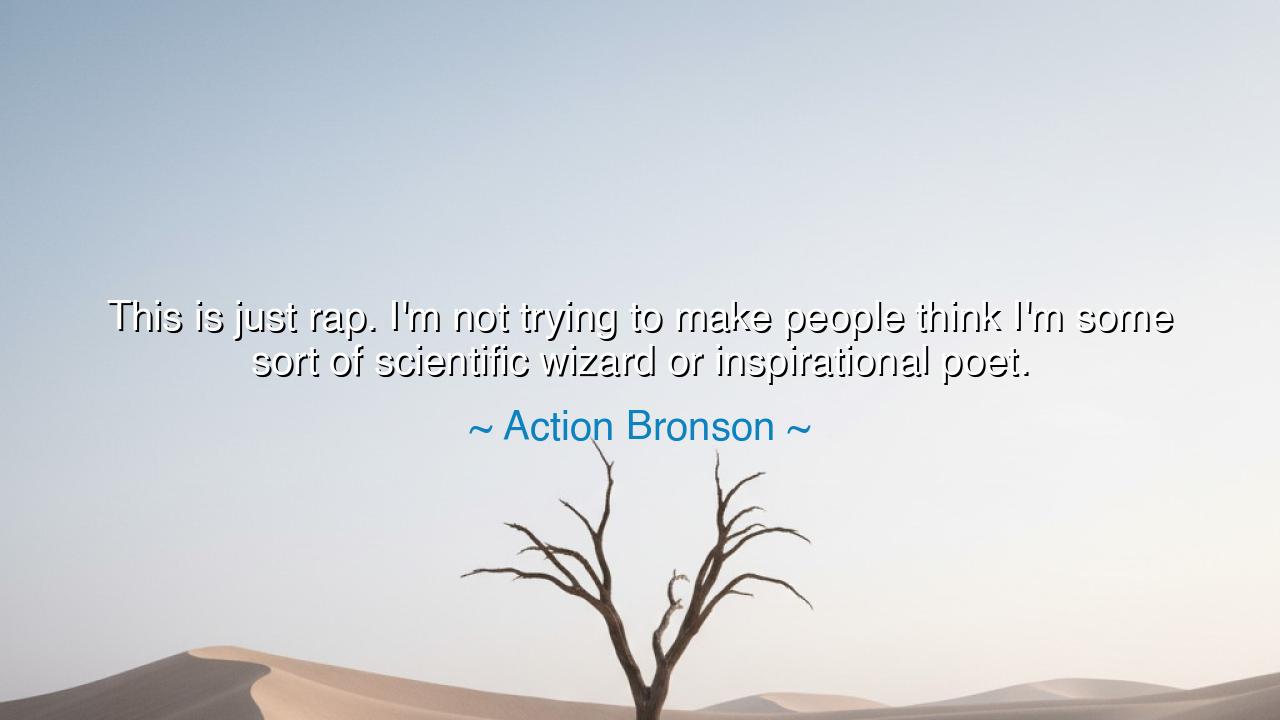
This is just rap. I'm not trying to make people think I'm some
This is just rap. I'm not trying to make people think I'm some sort of scientific wizard or inspirational poet.






In the grounded yet profound words of Action Bronson, there lies a truth as old as creation itself: “This is just rap. I'm not trying to make people think I'm some sort of scientific wizard or inspirational poet.” Though his tone is humble, even playful, the wisdom beneath it is deep — the wisdom of a man who knows himself. In an age where many seek to cloak their art in layers of pretense, Bronson’s words remind us that authenticity is the highest form of artistry. He does not claim to be a prophet or philosopher; he stands simply as a craftsman, shaping rhythm and rhyme with honesty, letting the music speak for itself.
The meaning of this statement lies in its rejection of illusion. Bronson understands that art loses its purity when it becomes a tool for ego. He resists the temptation to be seen as “some sort of scientific wizard” — a metaphor for false complexity, for the kind of artist who masks emptiness with cleverness. Nor does he wish to be labeled an “inspirational poet,” a title that, though noble, can become a burden when sought for its own sake. Instead, he speaks as the ancients would have — grounding himself in craft, in the joy of creation for its own sake. His music, he implies, does not need grand philosophy to justify its worth; it is real, and in its realness, it is sacred.
The origin of this wisdom can be traced to the eternal tension between art and ego, between truth and vanity. In ancient Greece, Socrates warned against those who dressed ignorance in ornate language — the sophists, who sought admiration rather than understanding. Bronson’s words echo the same warning: that an artist must never let performance overshadow purpose. His declaration — “This is just rap” — is an act of humility and power, for it affirms that the art itself, unadorned, is enough. He knows that music, like truth, does not need to pretend; it only needs to be.
Throughout history, the greatest creators have carried this same humility. Leonardo da Vinci, though a genius of infinite talent, often described himself merely as an “apprentice to nature.” Miles Davis, one of the most revolutionary musicians of the modern age, said, “Do not fear mistakes — there are none.” Both, like Bronson, understood that to create freely, one must first abandon the need to impress. The true artist is not the one who strives to be extraordinary, but the one who strives to be honest. For when honesty becomes the foundation, greatness follows naturally — just as clear water reflects the sky without effort.
Bronson’s tone, casual and self-assured, conceals a deeper kind of discipline — the discipline of simplicity. It is easy to hide behind complex metaphors or intellectual posturing; it is harder to stand naked in one’s truth. “This is just rap,” he says — but those words are not an apology. They are a declaration of devotion. He is reminding us that art need not justify itself by pretending to be something more than it is. The carpenter does not call himself a philosopher of wood, nor does the farmer call himself a scientist of soil — yet both create the foundations of life. So too, the rapper, the poet, the artist, builds the foundation of culture through authenticity.
There is also humility in the way Bronson dismisses the idea of being “inspirational.” He knows that true inspiration cannot be manufactured or forced; it arises naturally from sincerity. In this way, his philosophy mirrors the ancient masters of Zen, who taught that enlightenment cannot be pursued directly — it comes when one stops striving for it. By simply being himself, Bronson becomes more inspiring than any artist who tries to play the role of a sage. His refusal to claim grandeur is what makes his art grand.
The lesson for us all is clear: do your work for the love of it, not for the praise it brings. Do not burden your craft with pretense or pride. Whatever your art, let it flow from truth, and it will speak louder than any performance of greatness. Be content, as Bronson is, to say, “This is just what I do” — for in those simple words lies the deepest form of mastery.
And so, let us live by this wisdom: create with honesty, act with clarity, and let the world see you not as a wizard, but as a worker of the heart. In time, your humility will shine brighter than any title, and your authenticity will echo — as all true art does — far beyond the noise of self-importance. For when a man creates without pretending to be more than he is, he becomes exactly what he was meant to be: inspirational, not by effort, but by truth.






AAdministratorAdministrator
Welcome, honored guests. Please leave a comment, we will respond soon